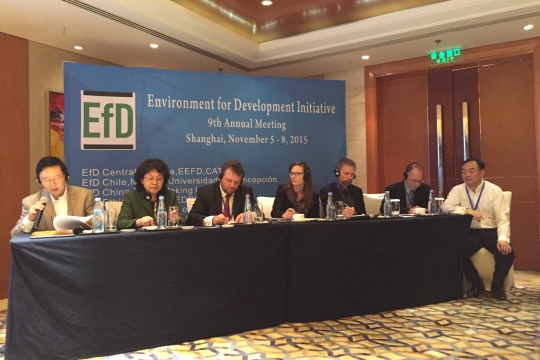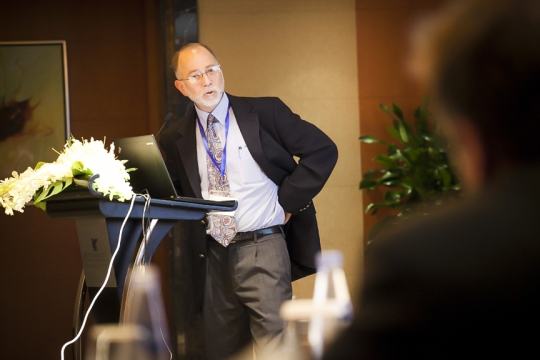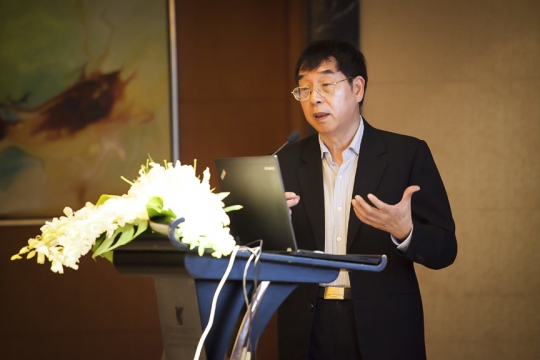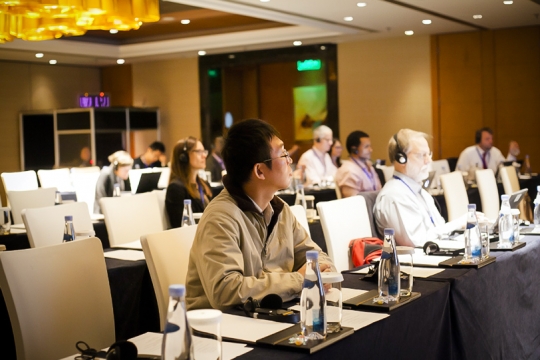The EfD policy day brought together researchers and policy makers in discussions on improving transportation and forest policies with a focus on the Chinese context. The country has experienced a dramatic increase in economic growth during the past decades. One consequence has been a veritable explosion in the number of passenger cars increasing from 23 to 120 million in only ten years. Problems of air pollution and congestion have followed.The morning session was held against this background with inputs from Professor Daoli Zhu, Associate professors Ping Qin and Haitao Yin and Mike Toman of the World Bank.
The cities of Shanghai and Beijing have applied a number of policies and made significant investments to manage the challenge of rapid urbanization. A large share of city spending has gone into the provision of better public transportation, metro and buses, and subsidies to make tickets affordable to virtually all. Strong measures have been made reduce car use, either by restrictions for certain license plates during certain days or by restricting additional cars to enter the streets. In Shanghai permits are auctioned and the cost has risen to a stunning 16 000 dollars thus virtually excluding large parts of the population from registering a car. Beijing use a lottery system where you may have to wait many years for a permit. To improve air quality and reduce global warming electric cars are highly subsidized. After a slow start, sales have now taken off with 100 000 cars sold last year. But is it an efficient policy instrument given that electricity in China comes from coal plants? There are no easy answers. Despite the range of measures introduced it was concluded that more is needed to manage the problems with pollution and congestion. Opinions differed on whether Chinese mega-cities should to follow the example of London, Singapore and Stockholm and introduce congestion charges. Concerns were raised about political acceptability and effectiveness. On the other hand there seemed to be an agreement on the need to address problems with current driving restrictions, to better coordinate between different modes of transportation, be they buses and subways or water ways and rail and to increase the attractiveness of public transportation.
The afternoon session discussed forestry tenure reform. Having a global outlook, Andy White of Rights and Resource Initiative argued that there are two trends that affect forest tenure. The first is a global demand for forest products and forest land and the second is a growing demand for justice. The demand for justice comes primarily from people living in and by forests with customary rule. Increasingly governments have transferred land from the state to collectively owned or managed forests. China is an interesting forerunner in the transfer of user rights to households. Collectively owned forests account for about 60% of Chinese forests and 70% of forest products. Since 2008 a reform gives Chinese communities the option to allocate management rights to households. It has in many ways been a success. About 90 million households have been received forest-land certificate and results show important gains in productivity, incomes and employment. However, according to Guangcui Dai, from the State Forestry Administration challenges remain, a large problem is that around 40 % of households with certificates leave there land unmanaged. In addition the market for transfer of rights is not efficient and issues of pricing and oversight need to be developed. Chinese researchers have closely monitored impacts of the tenure reform and there is a strong interest for improving the system further. A panel which also included Yongfan Liu, Jintao Xu, Elizabeth Robinson, Rodney Smith discussed inter alia whether temporary subsidies for tenure reform could be seen as green technology, equivalent to subsidies for solar energy etc and noted that China’s focus on productive use of forest resources in its tenure reform may be more useful than mainly focusing on protection of forests often applied in several other countries. As the policy day came to its close it was clear that research is critical for evaluating impacts of policies and that interactions between researchers and the policy community brings mutual learning.
By: Olof Drakenberg





